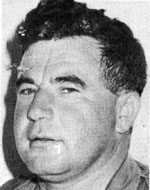Pless (Stempel), Moshe
Son of Zvi and Roche. He was born on July 20, 1933 in Poland. He spent his childhood in the Soviet Union, where the family fled at the beginning of World War II, when the Nazis and the Soviets divided Poland. At the end of the war, when Moshe finished elementary school, he first encountered Judaism and the Jewish question – and when all the children declared their nationality he suddenly faced the question: Where will the Jews return? After a while, one of the teachers’ instructors called him an anti-Jewish booze – and then Moshe discovered Zionism. Through Germany, Moshe arrived with his family to Israel, and he was 14. He did not even know a single Hebrew word, but from the day he set foot on the land he felt “like home.” His brother, who had come to Israel before the war, Moshe became accustomed – and he decided to speak only Hebrew: During the War of Independence Moshe was a Gadna man in Ramat Gan, and when he reached the time of his enlistment in 1951, he turned to the paratroopers. He was among the best commanders in the Israel Defense Forces and participated in most of the reprisals they carried out in the fifties.In the major retaliatory operation in Gaza, Moshe proved his ability as commander and fighter, but in the next operation – the explosion of the Bahan-Yunis police station – Was injured, and the explosive device that was intended to break through the gates of the Egyptian police did not explode – and Moshe leapt out of his half-track, himself bursting into the building and despite being wounded twice, he continued to do his job to clean the building and prepare it for an explosion. In the Six-Day War, Moshe participated in the battles for the liberation of Jerusalem as the deputy commander of Colonel Mordechai Gur, and he was given the right to hoist the flag of the State at the Western Wall. There was a historic flag, by the way, that one family brought him from the Old City to Hebrew Jerusalem, and Moshe thought of growing up and thinking the most important moment when Colonel Motta Gur assigned him to occupy the Western Wall and to raise the flag of the state. “Moshe related one day later,” what I felt when the flag was raised on the heights of the Western Wall. “During his service he arrived Moshe was promoted to lieutenant colonel – on September 19, 1968, Lieutenant Colonel Moshe was the commander of a force that was hunting for saboteurs, and was his last activity in the Jordan Valley when he first jumped and was wounded in the first volley of terrorists. And as in the past, he grew up with a pain that caused him severe wounds and continued his mission – to head his men and climb to the cliffs under the enemy’s fiery fire, but this time he fell in battle. “Major General Doron Manor and the soldier Shamai Shayevitz participated in the funeral, which was attended by thousands of people – including the Minister of Defense, Moshe Dayan, the Chief of Staff, Lieutenant General Haim Bar-Lev, the Chief Rabbi Major General Shlomo Goren and senior IDF officers. Thousands of people came to pay him the last honor. Among his captors was his commander, Brigadier General Mordechai Gur, who said, among other things, that he was a hard and tough commander, but he built the brigade and he trained it for war. A commander could not expect a lieutenant to be more loyal than Moshe. “In 1975, the medal he received was replaced by a medal of courage.
